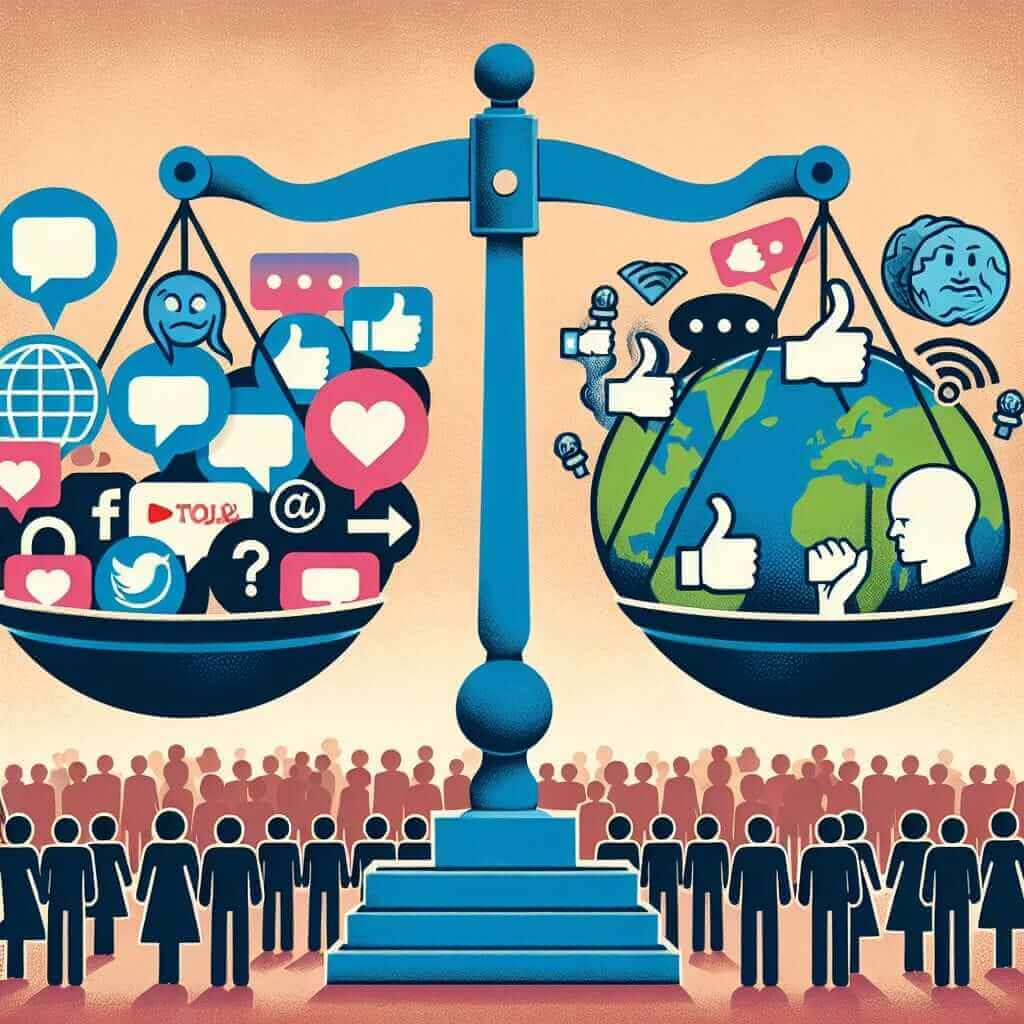The impact of social media on democratic processes has become a noteworthy subject of discussion and analysis, particularly in the context of recent global events. In recent IELTS exams, topics related to social media and its influence on various aspects of society have been recurrent. Given the growing importance of this theme, it is highly probable that such topics will continue to appear in future IELTS writing tests.
Common IELTS Writing Task 2 Topics on Social Media and Democracy:
- The role of social media in influencing public opinion during elections.
- The impact of digital media on political participation and civic engagement.
- The influence of social media on public discourse and political polarization.
For our model essay, we will focus on the following topic:
Discuss the impact of social media on democratic processes. To what extent do you agree or disagree with this statement?
Analyzing the Topic
This essay prompt asks you to discuss the extent to which you agree or disagree with the statement regarding the impact of social media on democratic processes. To craft a high-scoring response, it’s essential to:
- Clearly state your position.
- Provide well-organized arguments.
- Support your points with relevant examples.
- Ensure coherence and cohesion throughout the essay.
Model Essay
Impact of Social Media on Democratic Processes
In contemporary society, social media has become an integral part of political discourse and democratic processes. While it offers numerous advantages in fostering political engagement and transparency, it also presents significant challenges. This essay will argue that although social media enhances democratic processes, it simultaneously poses threats that must be addressed.
Firstly, social media platforms have revolutionized the way information is disseminated and consumed. They offer real-time updates and a plethora of viewpoints that empower citizens to make informed decisions. For instance, during elections, platforms like Twitter and Facebook allow candidates to communicate directly with voters, thereby promoting transparency. Additionally, social media empowers marginalized communities, providing them with a voice that might otherwise be unheard.
However, while social media has these benefits, its drawbacks cannot be overlooked. One significant issue is the spread of misinformation and fake news, which can manipulate public opinion and undermine democratic processes. For example, during the 2016 US presidential election, false information propagated on social media significantly influenced voters, leading to widespread debates about the integrity of the election. Moreover, social media algorithms often create “echo chambers,” where users are exposed only to information that reinforces their pre-existing beliefs, exacerbating political polarization.
Despite these challenges, it is crucial to recognize that the impact of social media on democracy largely depends on how it is utilized by both users and policymakers. Educational initiatives to improve media literacy and critical thinking, alongside stricter regulations to combat misinformation, can mitigate the adverse effects of social media. Enabling citizens to critically assess the information they encounter will ensure that social media serves as a tool for enhancing, rather than diminishing, democratic processes.
In conclusion, while social media has undeniably transformed the landscape of democratic engagement, its impact is twofold. It can significantly promote political participation and transparency; however, without proper regulation and education, its negative consequences can undermine the democracy it aims to support. Thus, a balanced approach that maximizes the benefits while addressing the challenges is essential for safeguarding the integrity of democratic processes.
Word Count: 313
Tips for Writing on This Topic
-
Vocabulary and Grammar:
- Use specific vocabulary related to social media and democracy (e.g., transparency, misinformation, echo chambers).
- Employ complex sentences and varied structures to demonstrate language proficiency.
-
Coherence and Cohesion:
- Use transitional phrases to link your ideas (e.g., “Firstly,” “However,” “Moreover,” “In conclusion”).
- Structure your essay with clear paragraphs, each containing a single main idea.
-
Examples and Evidence:
- Provide specific examples to support your arguments.
- Refer to current events or historical incidents where appropriate.
Key Vocabulary to Remember
-
Transparency (noun) /trænsˈpærənsi/: The quality of being done in an open way without secrets.
- “Transparency in political campaigns is essential for a fair election.”
-
Misinformation (noun) /ˌmɪsɪnˈfɔːrmeɪʃən/: False or inaccurate information, especially that which is deliberately intended to deceive.
- “Social media platforms must take steps to combat the spread of misinformation.”
-
Echo Chamber (noun) /ˈɛkoʊˌʧeɪm.bər/: An environment in which an individual encounters only information or opinions that reflect and reinforce their own.
- “Echo chambers can lead to increased political polarization.”
-
Polarization (noun) /ˌpəʊləraɪˈzeɪʃən/: Division into two sharply contrasting groups or sets of opinions or beliefs.
- “Political polarization has been exacerbated by social media algorithms.”
-
Civic Engagement (noun) /ˈsɪvɪk ɪnˈɡeɪʤmənt/: Individual and collective actions designed to identify and address issues of public concern.
- “Social media can be a powerful tool for promoting civic engagement.”
Conclusion
In summary, the role of social media in democratic processes is complex and multifaceted. While it has the potential to enhance political participation and transparency, there are also significant risks that need to be mitigated. Future IELTS tasks on this topic might involve similar discussions, so it is crucial for test-takers to be well-prepared. Practice essays on related themes, such as the influence of social media on public opinion during elections, can provide valuable preparation.
Other possible related IELTS essay prompts include:
- To what extent do you agree that social media plays a crucial role in modern elections?
- How does social media affect political polarization? Discuss with examples.
By understanding both the advantages and disadvantages of social media in democratic processes, candidates can deliver well-rounded and insightful essays that cater to the expectations of the IELTS examiners.

For further reading on related topics, consider exploring these articles: